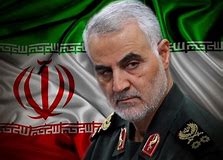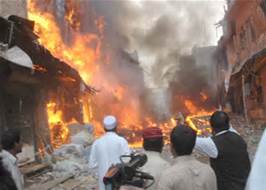Middle EastPolitical
January 4, 2020

Killing of Soleimani and other leaders of Shia militia groups in Iraq is a serious setback to Iran in the short run but will not alter the Islamic Republic’s regional strategic plans
By Prasad Nallapati
What has long been feared has happened. Maj. Gen. Qassem Soleimani, Chief of the Al Quds (AQ), the external force of the Iranian Islamic Republic Guard Corps (IRGC), was killed in an American missile hit at the Baghdad airport in the early hours of Friday (January 3, 2020) along with Jamal Jaafar Ibrahimi @ Abu Mahdi al-Mohandes, leader of the pro-Iran Iraqi militia, Kata’ib Hezbollah (KH). A few hours later, six more commanders of the militia were killed in another missile attack on their car. More were picked up by the Marines.
The US and Iran had so far been engaged in very restrained and low-intense military exchanges since the Trump administration withdrew from the Iranian nuclear accord, the JCPOA, three years ago. The US had chosen not to respond in kind when Iran shot down its drone, nor when a Saudi ARAMCO oil facility was badly crippled in a missile attack by Houthis, the Yemeni rebel group supported by Iran. Tehran too confined to measured proxy warfare and refrained from much threatened maritime adventures.
However, there had always been a dreaded feeling that this might quickly go wrong with catastrophic results in case either side makes a mis-judgement of the other’s intentions and capabilities.
That is precisely what happened. Starting in October last, there were simultaneous “popular” uprisings in Iran over hike in oil prices and in Lebanon and Iraq demanding democratic reforms and change of the regimes. Iranian consulates in Iraq were attacked. Iran and its proxy militias have ruthlessly put down the unrest, which they blamed on the US. There were heavy casualties.
Kata’ib Hezbollah launched a rocket attack on a US military base in Iraq on December 28 in which one contractor was killed. American retaliatory strikes next day on several KH sites killed several of its commanders. The militia crossed the red line and stormed into the US embassy in Baghdad on December 31, almost repeating Benghazi in Libya. They soon withdrew from the embassy on assurances of the Prime Minister, but the damage has been done.
Iran and its proxies have underestimated President Trump’s resolve. Even after the Embassy breach, Iranian Supreme leader Ayatollah Khamenei taunted Trump, “You can’t do anything, we will unhesitatingly confront and strike you.”
What he forgot was that the President is facing an impeachment trial in the election year. His election in 2015 was largely due to opposition candidate, Hillary Clinton’s mishandling of the Benghazi mishap of 2012, when Islamist rebels in Libya stormed into US embassy and killed its ambassador. Clinton was then Secretary of State. Trump would have lost his re-election chance had Benghazi been re-enacted in Baghdad.
The Al-Quds leader was not a very difficult target for the Americans. Soleimani is on its `Terrorist’ list and he is a hated person among opposition groups in both Iraq and Syria. His movements were being carefully monitored as he was personally supervising militia activities. American military reports stated that he was responsible for killing of over 500 US soldiers in militia attacks in Iraq between 2005-11. He single-handedly oversaw Al-Quds operations in creating and mobilizing Shia militia forces in support of Bashar-al-Assad regime in Syria and against the terror groups of the ISIS and Al Qaida in the two countries. He is believed to have visited Moscow and influenced President Putin to intervene in favour of Assad in early days of Syrian civil war. He apparently convinced Putin that the US, under the Obama administration, would not object to Russian intervention nor would take any steps to undermine it. He also stated in another context that the US had no appetite to attack Iran and was more eager to have a nuclear agreement with it.
The killing of Soleimani and other leaders of Shia militia groups in Iraq is a serious setback to Iran in the short run but will not alter the Islamic Republic’s regional strategic plans. He was replaced within hours by his deputy for 20 years, Brigadier General Ismail Ka’ani (Ismail Ghaani). He oversaw weapon shipments and financial transfers to Shia militia groups and Al Quds elements in the Middle East and Africa. He is, therefore, not a stranger to the game and seamlessly fits into his new position. The Iraqi Shia militias will soon have their new leaders.
Hence, President Trump’s statement that the killings are meant to “end the war and not to begin one” may prove to be short lived hope. The US is only likely to be pulled deeper into the Middle East vortex.
Meanwhile, Ayatollah Khamenei and most other Iranian leaders are threatening to take revenge against the US and its interests in the region. As the funerals of Soleimani and other commanders take place during the weekend, there will be more rhetoric coming from Iran and Iraq. But, their ability to launch any spectacular attacks is very limited.
Low level rocket attacks on US military targets in Iraq and Syria will not have much impact. Washington my temporarily close its Embassy and consulates to limit any damage. Hezbollah may try attacking Israeli targets, but the latter’s response would be expensive for them. Saudi Arabia’s oil installations may possibly attract more attacks from Iranian proxies in Yemen unless adequate countermeasures are not taken. Commercial shipping through the Persian Gulf may prove to be soft targets. Cyber-attacks on US networks and its Gulf allies are a possibility although they are well prepared. Iran otherwise has no major capability to attack targets inside the US or its interests in other countries of the region.
The uncanny beneficiaries of this imbroglio will be the Islamic State and the Al Qaida. The withdrawal of the US forces and its Kurdish allies from northern Syria and Turkish deployment there has already given a new lease of life to the IS, which made its first come back attack recently. It is found to be reactivating in Iraq too. It will take no time to make a reappearance if the current political unrest and confusion continues there for long.
This has been the situation even before the killing of Soleimani and will continue to be so. His elimination is unlikely to alter the situation in any significant way. Oil prices have seen a 3 per cent surge but this may not sustain for long. Although Iraqi supplies may have some difficulties in the shorter run, they are likely to remain unaffected as much of their supplies come from northern Kurdish areas, which are generally stable. Saudis may be better prepared now to protect their oil installations from Houthi attacks. However, if Iran attempts to block the Strait of Hormuz to prevent shipping vessels passing through it, it may have significant impact on oil prices.
(Prasad Nallapati is President of the Hyderabad-based think tank, Centre for Asia-Africa Policy Research and former Additional Secretary to the Govt of India)




